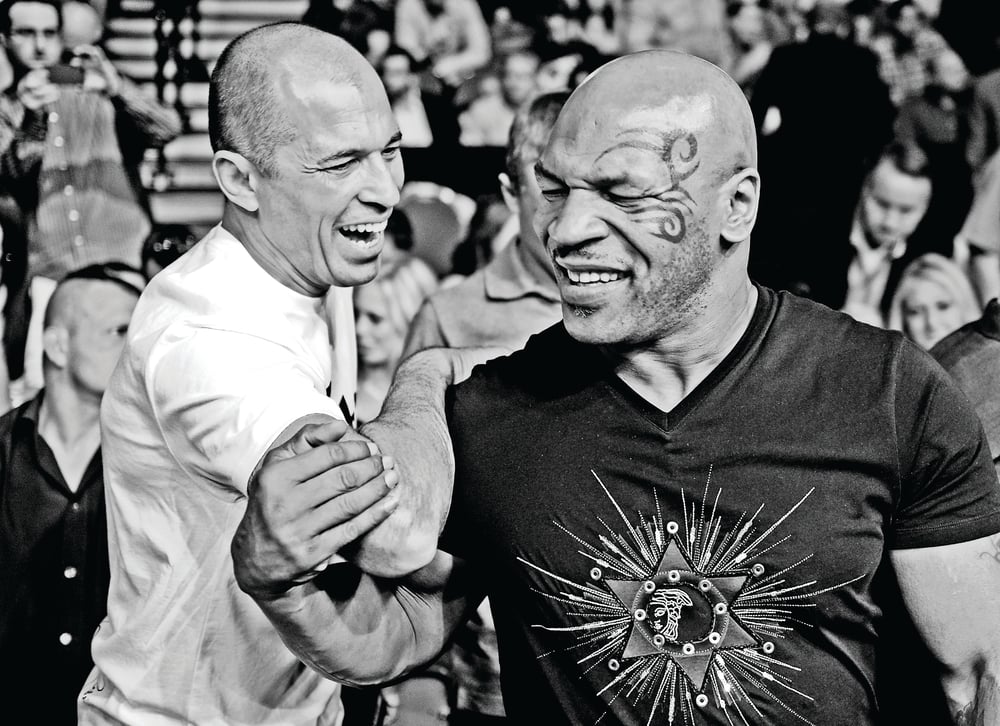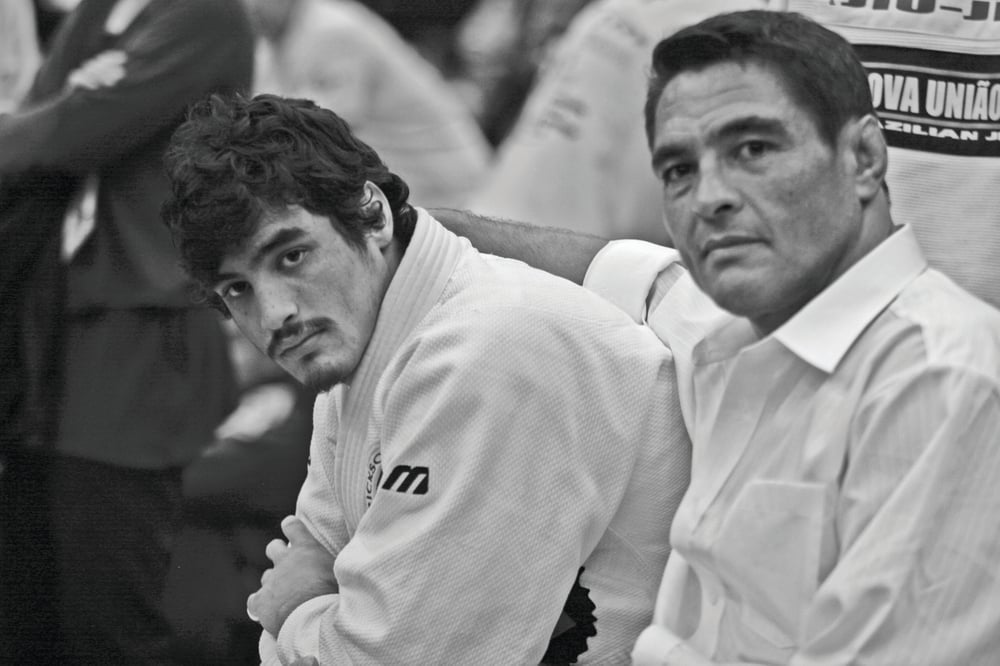
Issue 173
December 2018
Without the Gracies, there would be no UFC. Rorion had the idea, Royce won the first tournament and their legacy and influence continue to resonate throughout MMA thanks to their dedication to the art of Jiu-Jitsu. We pay tribute to the remarkable family
You know that you have achieved legendary status within combat sports when your surname is synonymous with sport itself. Known throughout the globe, Gracie Jiu Jitsu is practiced by professionals, celebrities and everyday fighters alike.
The family were not only martial artists in every sense of the word but also highly astute businessmen and marketing geniuses. They knew that the world loved violence and aggression. And they had one of its finest practitioners in their family: Rickson Gracie. However, there are few Ricksons in this world but but everyone could be taught to be a Royce. And the smartest move the Gracie family ever made was to realize that it would be Royce, not Rickson, who would be both the template for what any fighter might achieve and the catalyst for the greatest revolution in combat sports in over a century.
Selected by his older brother, Rorion, to represent the family’s jiu-jitsu in the first-ever UFC, Royce will be forever immortalized as the champion of the original UFC tournament, held in Denver, Colorado, 25 years ago.
Then 27, he was the practitioner from the Gracie family who brought Brazilian jiu-jitsu to worldwide prominence for the first time, and sent fighters hurrying to their nearest gym to de-mystify its art.
The concept behind UFC was simple: which fighting style is best? On November 12th 1993, against boxing, karate, kickboxing, taekwondo, shootfighting, savate and sumo, Gracie jiu-jitsu emerged from the eight-man tournament as the answer in a total of just four minutes and 49 seconds, thanks to three submissions from Royce.
Now 51, he continues to be an ambassador for his family art and the sport he helped build. Despite his involvement in the UFC from the very beginning, during the times when there were ‘no holds barred’ he is the picture of health, his mind sharp, his features intact and his body fit and healthy.
“A good diet – a Gracie diet. That’s what keeps me in shape,” he says, by way of explanation for his healthy demeanor. “I don’t go out, drink or smoke. So, it’s about following the Gracie diet and always training. Regarding the diet, we eat everything but we just combine the foods in such a way for an easy digestion. That’s the easy way to explain this. So, I cannot afford to get sick on the day of the fight or when teaching a class. Pushing the body the way we push ourselves, we have to get an easy digestion. I eat a lot of fruits. Do I look like I’m out of shape? (laughs). I’m still training with my conditioning coach, James Strom, too.
“I travel a lot,” he continues. “Yet I do not suffer from jet lag. By the time jet lag arrives I leave (laughs). I go to a different place. I don’t let jet lag arrive. Drinking a lot of water helps. I take a couple of days off to recuperate. Mentally, I don’t let it affect the fight. I keep my state of mind flat line. I don’t celebrate if I win. I don’t cry because I lost. I just learned how to be like this and understand why things happen. So, it’s a state of mind which is to keep it neutral.”
Rorion Gracie, son of Helio Gracie, the founder of Gracie Jiu- Jitsu was the brainchild behind the UFC concept. He wanted to market the family art in the biggest, most impactful ways and using methods developed by his father he worked to tell the world that Gracie Jiu- Jitsu was the most effective form of fighting.
“Someone came to write an article on us,” Rorion recalls. “As it happens, it was 50 years after my father had challenged boxer, Joe Louis. So, the writer said, ‘Hey, what if we did something with Mike Tyson?’ At the time he was very much in the news and I said, Yeah it will be great, and on the back page of the magazine we have Royce challenging Tyson. Once again, Tyson is a very tough guy, no matter where we cut it. Of course, a punch from ‘Iron’ Mike, or anyone actually, can knock someone out. Therefore, never underestimate an opponent, especially someone like Mike Tyson.
That said, we believe that in a real fight, there’s a good chance of getting into a clinch, and if you can then can take the opponent to the ground, unless he knows jiu-jitsu, his chances are not very good. There’s a possibility that a punch can land, but there’s a larger possibility that between a boxer and a jiu-jitsu person, that the punch will not land perfectly. The odds are in the favor of the jiu-jitsu man. So, that was the idea of the challenge, a good marketing opportunity the magazine offered us.”

Before the UFC, boxers were the most revered fighters in combat sports. By starting the UFC, the Gracies had a chance to show the world that jiu-jitsu was far more effective than any other fighting art, even taking into account the reality of both size difference and appearance.
“Boxing is great, but it’s very limited to standing up to each other squaring off and punching at an arm’s reach,” explains Rorion. “But in a real fight, most fights will go into a clinch and end up on the ground. Even among boxers they end up in a clinch when they start getting beat up. If there’s no referee, nobody can knock each other out because they’re holding onto each other. So if that happens among the boxers, imagine if a person’s intent on grabbing the opponent. If that’s your objective, it’s going to be very hard for you to stop the person from grabbing you. That’s why we feel that boxing, karate and other striking arts are all good, but jiu-jitsu is more complete for a real street fight because it deals with standing up and on the ground.
“The idea of using Royce instead of Rickson was because I wanted to emphasise the technique,” Rorion continues. “Rickson was, of course, a much stronger and more impressive fighter. He’s amazing, no doubt. But I thought if Rickson fights and wins, then people are going to say, ‘No wonder he won, look how big and strong he is.’ But if I put a tiny, skinny guy to do the same job and Royce wins, it’s much more impressive of what jiu-jitsu can do. So the strategy was right, even though a lot of people didn’t like it at the time, I wanted to do it my way.”
What if it had all gone wrong? What if Royce had been beaten up by Gerard Gordeau? How did Royce cope with the pressure of having the family legacy rest on his shoulders and what does that say about the mindset of the Gracies?
“I didn’t put pressure on myself thinking, ‘Oh, my God. I’m going to be on the big stage,’ Royce answers. “To me, it was just another training day with more people watching, I looked at it as another training sparring partner. What is fear? Fear doesn’t exist. It’s a creation of the imagination.”

What about Mike Tyson, the most feared fighter of his generation and the benchmark that the Gracies wanted to surpass in order to spread the word about the effectiveness of their martial art? How would Royce have felt if Mike Tyson had walked into the Octagon and squared up to him in UFC 1?
“Well, he had a chance,” Royce acknowledges. “If he hit me even on my arm or once in the right spot I would go down. I’m not punch proven. If those guys hit me, I’d go down. It’s true. If Mike Tyson hit me on my shoulder, the fight is over! But if he missed that punch and I got into a clinch, then he would have been in trouble. So, yes. But to say that somebody doesn’t have a chance, it’s not a realistic statement. Anyone has a chance. Mike Tyson came to my last fight at Bellator when I fought Ken Shamrock.
“Tyson’s awesome,” he adds. “I’m a big fan of Mike Tyson. Are you kidding me? I was backstage with him at a UFC event a couple of years ago, and there’s a photo where Tyson’s choking me and Chuck Liddell is punching me. He’s a fan of MMA just like I’m a fan of boxing. We got on real great right off the bat.”
Fighters have respect and appreciation of what their opponents, colleagues or team mates do. A fighter knows what it takes to compete and the ability to achieve success involves commitment. A knowledge of fighting breeds confidence which is what makes the ability to succeed more of a mental challenge than just a physical one. It also develops respect, hence the reason why even the biggest stars in their relevant field become fans of each other, something that is clearly highlighted by such chance interactions when the biggest stars come together.
However, how did Royce Gracie feel about the part he has played in building not only his personal legacy but also in helping build a global sport?
“I didn’t make the whole sport big,” he replies modestly “I was the one who won the first few when there were no rules, no time limits and no weight divisions. There were multiple fights, three or four fights in one night. I’m the one who showed the technique that I learned from my father. I showed the world what I learned from him. But I wasn’t the one who made the UFC big; Dana White did that.”
“I love my life!,” Royce continues. “Traveling all over the world for Bellator. I’m an ambassador for the organization. We’re just getting ready so I’m bouncing all over the place helping the new fighters coming up.”
Finally, on the 25th anniversary of a sport that he originally conceived and help create, how does Rorion Gracie feel about the UFC being so big and worth so much money? “I love it,” he replies without missing a beat. “How many people do you know that have had an idea and implemented the idea that eventually was worth $4 billion? I had a vision. I wanted to educate people about what worked and what did not work in a real fight. For me it was never about the money. Money was always a consequence of my work, not the reason for my work.”
Afterword:
*Article written in 2018* - 26th Anniversary(2019)
...










